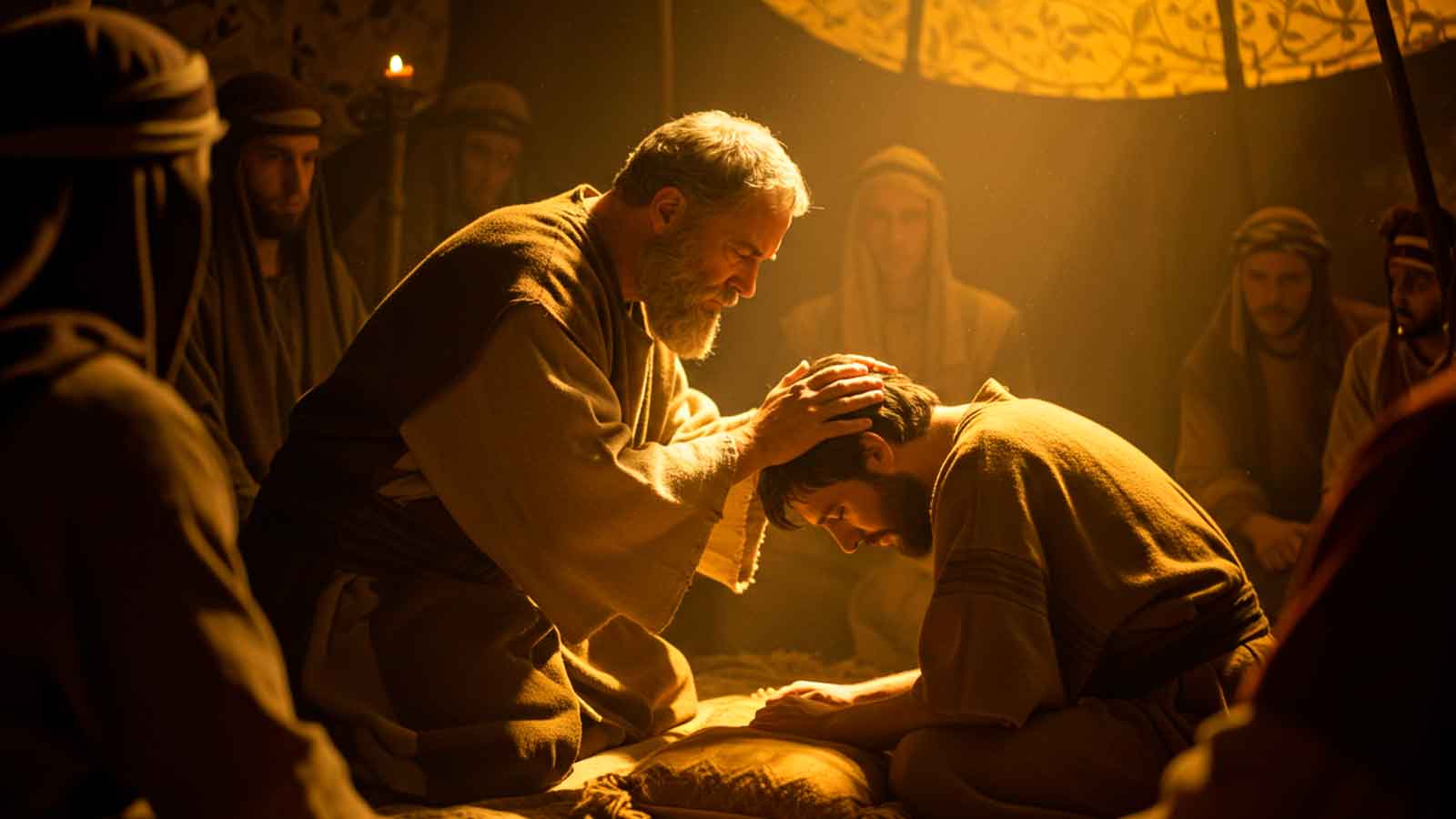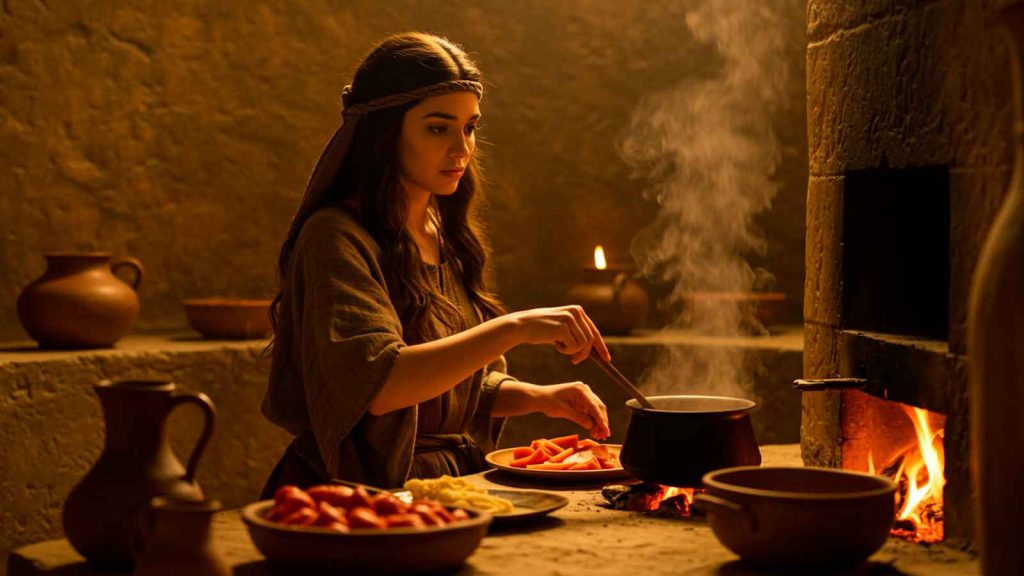Genesis 27 is one of the most emblematic and dramatic chapters of the Old Testament. It recounts the moment when Jacob, with the help of his mother Rebekah, deceives his father Isaac to receive the blessing that was intended for Esau, his older brother.
This episode marks an important turning point in the story of the people of Israel and raises profound reflections on choices, character, consequences, and divine sovereignty.
Genesis 27 – Complete
¹ And it came to pass, when Isaac was old and his eyes were dim so that he could not see, he called Esau his elder son and said to him, “My son.” And he answered him, “Here I am.”
² And he said, “See now, I am old, and I do not know the day of my death;
³ Now therefore, take your weapons, your quiver and your bow, and go out to the field and hunt game for me.
⁴ Prepare for me a tasty dish, such as I love, and bring it to me that I may eat, so that my soul may bless you before I die.”
⁵ And Rebekah heard when Isaac spoke to Esau his son. And Esau went to the field to hunt for game and bring it.
⁶ Then Rebekah spoke to Jacob her son, saying, “Listen, I heard your father speak to Esau your brother, saying,
⁷ ‘Bring me game and prepare for me a savory dish, that I may eat it and bless you in the presence of the Lord before my death.’
⁸ Now therefore, my son, obey my voice in what I command you:
⁹ Go now to the flock and fetch me two good young goats, and I will make of them a savory dish for your father, such as he loves;
¹⁰ Then you shall take it to your father, that he may eat, so that he may bless you before his death.”
¹¹ Jacob said to Rebekah his mother, “Look, my brother Esau is a hairy man, and I am a smooth man.
¹² Perhaps my father will feel me, and I shall seem to him as a deceiver; then I would bring a curse on myself and not a blessing.”
¹³ But his mother said to him, “Let your curse be on me, my son; only obey my voice, and go, get them for me.”
¹⁴ So he went and got them, and brought them to his mother, and his mother prepared a tasty dish, such as his father loved.
¹⁵ Rebekah then took the best clothes of Esau her elder son, which were with her in the house, and put them on Jacob her younger son.
¹⁶ She put the skins of the young goats on his hands and on the smooth part of his neck,
¹⁷ and she placed the savory dish and the bread she had prepared into the hand of her son Jacob.
¹⁸ So he went to his father and said, “My father!” And he said, “Here I am; who are you, my son?”
¹⁹ Jacob said to his father, “I am Esau your firstborn; I have done as you told me. Please rise, sit and eat of my game, that your soul may bless me.”
²⁰ Isaac said to his son, “How is it that you have found it so quickly, my son?” And he said, “Because the Lord your God brought it to me.”
²¹ Then Isaac said to Jacob, “Come near, that I may feel you, my son, whether you are really my son Esau or not.”
²² So Jacob went near to Isaac his father, and he felt him and said, “The voice is Jacob’s voice, but the hands are the hands of Esau.”
²³ And he did not recognize him, because his hands were hairy like his brother Esau’s hands; so he blessed him.
²⁴ Then he said, “Are you really my son Esau?” And he said, “I am.”
²⁵ “Bring it near to me,” he said, “that I may eat of my son’s game, so that my soul may bless you.” So he brought it near to him, and he ate; and he brought him wine, and he drank.
²⁶ Then his father Isaac said to him, “Come near now and kiss me, my son.”
²⁷ And he came near and kissed him; and he smelled the smell of his clothes and blessed him and said, “See, the smell of my son is like the smell of a field which the Lord has blessed;
²⁸ Therefore may God give you of the dew of heaven and of the fatness of the earth and plenty of grain and wine.
²⁹ Let peoples serve you and nations bow down to you. Be lord over your brethren, and let your mother’s sons bow down to you. Cursed be everyone who curses you, and blessed be those who bless you.”
³⁰ Now it happened, as soon as Isaac had finished blessing Jacob, and Jacob had scarcely gone out from the presence of Isaac his father, that Esau his brother came in from his hunting.
³¹ He also had prepared a savory dish and brought it to his father, and said to his father, “Let my father arise and eat of his son’s game, that your soul may bless me.”
³² And his father Isaac said to him, “Who are you?” So he said, “I am your son, your firstborn, Esau.”
³³ Then Isaac trembled exceedingly and said, “Who was it then who hunted game and brought it to me? I ate all of it before you came, and I blessed him—and indeed he shall be blessed.”
³⁴ When Esau heard the words of his father, he cried out with a great and exceedingly bitter cry, and said to his father, “Bless me—me also, O my father!”
³⁵ But he said, “Your brother came with deceit and has taken away your blessing.”
³⁶ And Esau said, “Is he not rightly named Jacob? For he has supplanted me these two times. He took my birthright, and now he has taken my blessing.” Then he said, “Have you not reserved a blessing for me?”
³⁷ Then Isaac answered and said to Esau, “Indeed I have made him your lord, and all his brethren I have given to him as servants; with grain and wine I have sustained him. What then shall I do for you, my son?”
³⁸ Esau said to his father, “Have you only one blessing, my father? Bless me—me also, O my father!” And Esau lifted up his voice and wept.
³⁹ Then Isaac his father answered and said to him, “Behold, your dwelling shall be of the fatness of the earth and of the dew of heaven from above;
⁴⁰ By your sword you shall live, and you shall serve your brother; and it shall come to pass, when you become restless, that you shall break his yoke from your neck.”
⁴¹ So Esau hated Jacob because of the blessing with which his father blessed him, and Esau said in his heart, “The days of mourning for my father are at hand; then I will kill my brother Jacob.”
⁴² And the words of Esau her elder son were told to Rebekah; so she sent and called Jacob her younger son and said to him, “Surely your brother Esau comforts himself concerning you by planning to kill you.
⁴³ Now therefore, my son, obey my voice: arise, flee to my brother Laban in Haran,
⁴⁴ and stay with him a few days, until your brother’s fury turns away;
⁴⁵ until your brother’s anger turns away from you and he forgets what you have done to him; then I will send and bring you from there. Why should I be bereaved of you both in one day?”
⁴⁶ And Rebekah said to Isaac, “I am weary of my life because of the daughters of Heth. If Jacob takes a wife of the daughters of Heth, like these who are of the daughters of the land, what good will my life be to me?”

The Context of Genesis 27
Isaac and His Old Age
At the beginning of Genesis 27 we see Isaac old and nearly blind. Sensing that his days were numbered, he calls his son Esau to grant him the patriarchal blessing—a gesture that, in Hebrew tradition, meant far more than words; it involved destiny, inheritance, and spiritual authority.
The Blessing as Sacred Heritage
The blessing Isaac intends to grant Esau is not a mere statement. In the biblical context, it carries spiritual weight that defines a lineage’s future. Genesis 27 presents this blessing as a turning point, for it determines who will carry forward the promise made by God to Abraham.

Rebekah’s Plan and Jacob’s Deception
Rebekah’s Initiative
Upon hearing the conversation between Isaac and Esau, Rebekah makes a drastic decision: she plans with Jacob a way to deceive his father. She believes Jacob is God’s chosen one to receive the blessing and therefore acts to secure that outcome, even through questionable means.
Jacob’s Disguise
Rebekah prepares a meal and dresses Jacob in Esau’s clothes, covering his arms and neck with goat skins because Esau was hairy. This part of Genesis 27 reveals the level of detail and intent involved in the deception, showing how meticulously the scheme was planned.
The Blessing Is Given to Jacob
Isaac’s Hesitation
Even with failing eyesight, Isaac doubts the identity of the son before him. He hears Jacob’s voice but feels Esau’s hair and smells his clothes. Genesis 27 shows that despite his doubt, Isaac yields and confers the blessing.
The Content of the Blessing
The blessing Jacob receives speaks of abundance, dominion over peoples and over his brothers, and divine protection. It is a powerful declaration that will be fulfilled throughout Israel’s history. There is no taking it back: once spoken, the blessing holds eternal value.

Esau’s Reaction and the Father’s Grief
Esau Arrives Too Late
Right after Jacob leaves the tent, Esau arrives with the meal he prepared. Isaac’s surprise and shock are profound. In Genesis 27, the text describes Esau pleading for a blessing as well, but Isaac makes it clear that the principal blessing has already been given.
Esau’s Cry
Esau weeps bitterly, begging for some blessing. Feeling betrayed, he vows to kill Jacob after their father dies. The chapter ends with Rebekah instructing Jacob to flee to her brother Laban’s house.
Spiritual Lessons from Genesis 27
The Power of Words and Blessing
Genesis 27 shows us that words carry weight. The blessing given could not be revoked. This teaches the importance of our words and commitments, especially in spiritual contexts.
Divine Sovereignty Despite Human Error
Even through deception, God’s plans are not thwarted. Jacob becomes the patriarch of Israel’s lineage. This shows that God moves even amid human flaws, redirecting history according to His purpose.
Consequences of Our Actions
Rebekah loses daily life with her son Jacob. Esau feels betrayed and harbors hatred. Jacob flees and lives years away from home. Genesis 27 makes it clear that every action has impact and wrong decisions cause pain, even when made with good intentions.
Comparisons with Other Biblical Characters – Genesis 27
Jacob and Moses
Both had remarkable encounters with God and received significant promises. Yet, while Jacob deceives to obtain the blessing, Moses refuses glory and intercedes for the people. Genesis 27 highlights the start of a transformation journey that will intensify in the following chapters.
Esau and Cain
Like Cain, Esau feels rejected and betrayed, expressing a desire for vengeance. But unlike Cain, Esau will later reconcile with Jacob, showing that there is room for redemption.
The Symbolism of the Blessing in Genesis 27
Transfer of Spiritual Authority
The blessing Isaac gives Jacob symbolizes the transfer of authority and responsibility to lead God’s people. Genesis 27 is not merely a sibling rivalry; it concerns the continuation of the divine covenant.
The Struggle for God’s Favor
The chapter can also be seen as a reflection of humanity’s internal struggle for approval, identity, and purpose. Jacob sought the blessing because he longed to be accepted and to fulfill a greater destiny.
Curiosities about Genesis 27
Why Didn’t Isaac Detect the Deception?
Despite his suspicion, Isaac relied on physical senses—the touch, the smell, the taste. This warns us against trusting only our senses without spiritual discernment.
Where Was Esau During the Scheme?
Esau had gone out to hunt and prepare food for his father as requested. That provided Jacob and Rebekah the time they needed to carry out the plan, as described in Genesis 27.
Could the Blessing Be Revoked?
In the biblical context, no. A patriarch’s spoken word, especially in God’s name, was final. That makes the deception even more serious.
Practical Applications from Genesis 27
Beware of Shortcuts
Trying to reach promises through our own deceptive methods can bring harsh consequences. Genesis 27 teaches us to trust God’s timing and ways.
The Importance of Integrity
Jacob received the blessing but carried the weight of guilt and separation. Integrity is always worth more than gains achieved the wrong way.
God Can Restore the Story
Despite Jacob’s mistakes, God transforms him and fulfills His plan. That is hope for everyone who has erred: restoration is possible for those who repent.
Genesis 27 and the Lineage of Jesus
Jacob as an Ancestor of Christ
The blessing Jacob received points directly to the fulfillment of the messianic promise. Through the generations, it is from his descendants that the Savior, Jesus Christ, will come.
God’s Sovereignty in the Plan of Redemption
Even with the deception, God does not abandon His plan. He remains faithful to the promise made to Abraham, Isaac, and Jacob. Genesis 27 is another chapter in this story of redemption.
FAQ about Genesis 27
Did Jacob repent of the deception?
Yes. Later in his story, Jacob shows repentance and has a transformative encounter with God, who changes his name to Israel.
Why did Rebekah help Jacob deceive Isaac?
She believed the blessing should belong to Jacob and thought she was helping fulfill God’s will, even through wrong means.
Was Esau cursed?
No. Isaac gave him a lesser blessing, and Esau went on to become the father of a nation (the Edomites).
Is the blessing of Genesis 27 still valid today?
Yes. It is part of God’s plan culminating in the coming of Jesus Christ. Jacob’s lineage forms the foundation of the people of Israel.
Did God approve of what Jacob did?
There is no explicit approval of the deception. The text shows the consequences of the mistake but also God’s grace working despite it.
Conclusion – Genesis 27
Genesis 27 is far more than a family deception narrative. It is a chapter filled with spiritual, emotional, and prophetic layers. Observing each detail of the plot involving Isaac, Rebekah, Jacob, and Esau leads us to reflect on our own choices, on how we handle God’s promises, and on the impact our actions can have on others.
Even amid error, pain, and consequences, we see that God’s grace is not nullified. He continues to carry out His sovereign will, transforming hearts and redirecting destinies. Genesis 27 teaches that although we may try to hasten divine plans by our own methods, the best path is always to trust God, wait for His timing, and act with truth and integrity. After all, the most enduring blessings are those obtained with faith and obedience.
READ ALSO:
- Bible Verses of Healing and Miracles: Strengthen Your Faith
- Blessed Good Night by God: Spread Faith Before Sleeping
- Proverbs 31 3: A Wisdom Warning to Preserve Your Purpose
- Proverb 4 Complete with Explanation
FOLLOW US ON FACEBOOK